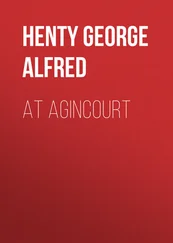“If you think well, my lord, to leave me here in command I will assuredly do the best in my power to prove myself worthy of your confidence; but it is a heavy trust for one so young.”
“I have thought that over, Guy, but I have no fear that you will fail in any way. Were the garrison wholly a French one I might hesitate, but half the defenders of the castle are Englishmen; and in Tom, the captain of the archers, you have one of whose support at all times you will be confident, while the French garrison will have learned from the three men who went with you that they would as readily follow you as they would a knight of experience. Moreover, good fighters as the English are, they are far more independent and inclined to insubordination than the French, who have never been brought up in the same freedom of thought. Therefore, although I have no doubt that they will respect your authority, I doubt whether, were I to put a Frenchman in command, they would prove so docile, while with the French there will be no difficulty. I might, of course, appoint John Harpen, who is ten years your senior, to the command; but John, though a good esquire, is bluff and rough in his ways, and as obstinate as a mule, and were I to leave him in command he would, I am sure, soon set the garrison by the ears. As an esquire he is wholly trustworthy, but he is altogether unfitted for command, therefore I feel that the choice I have made of you is altogether for the best, and I shall go away confident that the castle is in good hands, and that if attacked it will be as staunchly defended as if I myself were here to direct the operations.”
Two days later Sir Eustace with his family started, under the guard of ten English and ten French men-at-arms, for Calais. Before starting he formally appointed Guy as castellan in his absence, and charged the garrison to obey his orders in all things, as if they had been given by himself. He also called in the principal tenants and delivered a similar charge to them. The English men-at-arms were well pleased to be commanded by one whom they had known from childhood, and whose father they had been accustomed to regard as their master during the absences of Sir Eustace and Dame Margaret. The archers had not, like the men-at-arms, been drawn from the Summerley estate, but the devotion of their leader to Guy, and the tales he had told them of what had taken place in Paris rendered them equally satisfied at his choice as their leader. As for the French men-at- arms, bred up in absolute obedience to the will of their lord, they accepted his orders in this as they would have done on any other point. Sir Eustace left Guy instructions that he might make any further addition to the defences that he thought fit, pointing out to him several that he had himself intended to carry out.
“I should have set about these at once,” he had said, “but it is only now that the vassals have completed the work of rebuilding their houses, and I would not call upon them for any service until that was completed. I have told them now that such works must be taken in hand, and that, as they saw upon the occasion of the last siege, their safety depends upon the power of the castle to defend itself, I shall expect their services to be readily and loyally rendered, especially as they have been remitted for over six months. It would be well also to employ the garrison on the works—in the first place, because they have long been idle, and idleness is bad for them; and in the second place because the vassals will all work more readily seeing that the garrison are also employed. While so engaged an extra measure of wine can be served to each man, and a small addition of pay. Here are the plans that I have roughly prepared. Beyond the moat I would erect at the centre of each of the three sides a strong work, similar to that across the drawbridge, and the latter I would also have strengthened.
“These works, you see, are open on the side of the moat, so that if carried they would offer the assailants no shelter from arrows from the walls, while being triangular in shape they would be flanked by our fire. Each of these three forts should have a light drawbridge running across the moat to the foot of the wall, thence a ladder should lead to an entrance to be pierced through the wall, some fifteen feet above the level of the moat; by this means the garrison could, if assailed by an overwhelming force, withdraw into the castle. These outposts would render it—so long as they were held—impossible for storming-parties to cross the moat and place ladders, as they did on the last occasion. The first task will, of course, be to quarry stones. As soon as sufficient are prepared for one of these outworks you should proceed to erect it, as it would render one side at least unassailable and diminish the circuit to be defended. As soon as one is finished, with its drawbridge, ladder, and entrance, proceed with the next. I would build the one at the rear first. As you see from this plan, the two walls are to be twenty feet high and each ten yards long, so that they could be defended by some twenty men. After they are built I would further strengthen them by leading ditches from the moat, six feet deep and ten feet wide, round them. The earth from these ditches should be thrown inside the walls, so as to strengthen these and form a platform for the defenders to stand on. If the earth is insufficient for that purpose the moat can be widened somewhat.”
“I will see that your wishes are carried out, Sir Eustace; assuredly these little outworks will add greatly to the strength of the castle. Are the bridges to be made to draw up?”
“No; that will hardly be necessary. Let them consist of two beams with planks laid crosswise. They need not be more than four feet wide, and the planks can therefore be easily pulled up as the garrison falls back. I have told the tenants that during the winter, when there is but little for their men to do, they can keep them employed on this work, and that I will pay regular wages to them and for the carts used in bringing in the stones.”
Guy was very glad that there was something specific to be done that would give him occupation and keep the men employed. Sir Eustace had informed the garrison of the work that would be required of them, and of the ration of wine and extra pay that would be given, and all were well satisfied with the prospect. For the English especially, having no friends outside, found the time hang very heavy on their hands, and their experience during the last siege had taught them that the additional fortifications, of the nature of which they were ignorant, however, would add to their safety.
As soon, therefore, as Sir Eustace had left, Guy commenced operations. A few men only were kept on guard, and the rest went out daily to prepare the stones under the direction of a master mason, who had been brought from Arras by Sir Eustace. Some fifty of the tenants were also employed on the work, and as the winter closed in this number was doubled.
The quarry lay at a distance of half a mile from the castle, and as fast as the stones were squared and roughly dressed they were taken in carts to the spot where they were to be used. Guy had the foundations for the walls dug in the first place, to a depth below that of the bottom of the moats, and filled up with cement and rubble. The trenches were then dug at a distance of five feet from the foot of the walls. With so many hands the work proceeded briskly, and before springtime the three works were all completed, with their bridges and ladders, passages pierced through the castle wall, and stone steps built inside by which those who passed through could either descend into the court yard or mount to the battlements. At the end of September fifteen archers and men-at-arms arrived from England to take the place of those who had desired to return home, and who on their coming marched away to Calais.
Читать дальше












